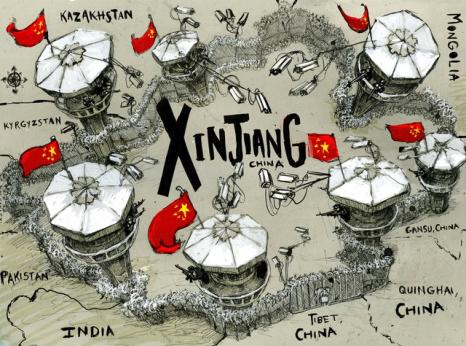China: Missing And Arbitrarily Detained In Xinjiang

Xinjiang is one of the most ethnically diverse regions in China. More than half of the region’s population of 22 million people belong to mostly Turkic and predominantly Muslim ethnic groups, including Uyghurs (around 11.3 million), Kazakhs (around 1.6 million) and other populations whose languages, cultures and ways of life vary distinctly from those of the Han who are the majority in “interior” China.
Since 2017, under the guise of a campaign against “terrorism” and “religious extremism”, the government of China has carried out massive and systematic abuses against Muslims living in Xinjiang. It is estimated that over a million people have been arbitrarily detained in internment camps throughout Xinjiang since 2017.
The report “Like We Were Enemies in a War”: China’s Mass Internment, Torture, and Persecution of Muslims in Xinjiang is the most comprehensive account to date of the crushing repression faced by Uyghurs, Kazakhs and other predominantly Muslim ethnic minorities in Xinjiang. The evidence Amnesty International has gathered provides a factual basis for the conclusion that the Chinese government has committed at least the crimes against humanity of imprisonment, torture, and persecution.
The Chinese authorities had denied the existence of internment camps until October 2018, when they began describing them as voluntary, free “vocational training” centres. China’s explanation, however, fails to account for the numerous reports of beatings, food deprivation and solitary confinement that have been collected from former detainees.
In 2019 the Chinese government claimed that they had closed the camps but did not provide any proof or unfettered access to journalists, human rights investigators, and diplomats. Instead, the Chinese government has made efforts to silence criticism by inviting delegations from different countries to visit Xinjiang for carefully orchestrated and closely monitored tours. The latest example is the UN High Commissioner for Human Rights’ visit to China in May 2022.
As one of the people whose relatives are in arbitrary detention said to Amnesty: “they [Chinese authorities] want to show the happy Uyghur, the dancing Uyghur. I think the [UN] investigation group they have to do their best to investigate the real thing…the real situation.”
Amnesty International launched the international campaign Free Xinjiang Detainees, and in less than four months collected more than 320,000 signatures on a petition calling for the closure of the internment camps and the release of everyone arbitrarily detained in internment camps and in prison in Xinjiang.
The government of China must immediately close all the remaining internment camps and release all persons held in internment camps or other detention facilities – including prisons – in Xinjiang, unless there is sufficient credible and admissible evidence that they have committed an internationally recognized offence.
Amnesty International is also calling on the UN High Commissioner for Human Rights to release her long-awaited report on Xinjiang and to publicly acknowledge the scale and severity of human rights violations in Xinjiang before her term concludes in August 2022.
Last but not least, the Human Rights Council must establish an independent international mechanism to investigate crimes under international law in Xinjiang, with a view to ensuring accountability, including through the identification of perpetrators.